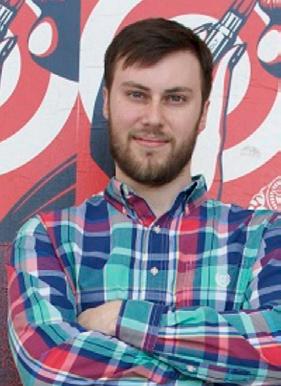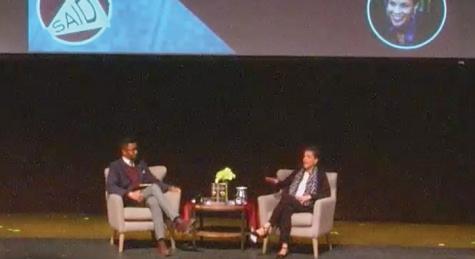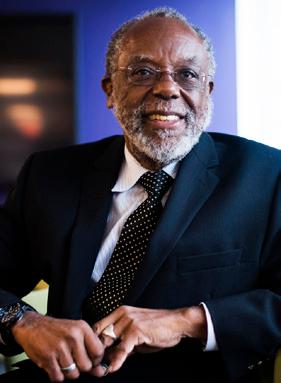A REPORT ON THE SEPTEMBER 24,2019 MORTON E. RUDERMAN MEMORIAL LECTURE:
12 Western Avenue, Petaluma, CA 94952
tel: 707.773.0654
fax: 707.778.1868
www.barclayagency.com
Mic hael Pol l an
Michael Pollan, What Can Psychedelics Teach Us About Spirituality? P ho t o : Je anne t t e M o nt go me r y B ar r o n
Bestselling Author & Sustainable Food Advocate
SEBASTIAN STOCKMAN
Associate Teaching Professor, Department of English College of Social Sciences and Humanities
For the past thirty years, Michael Pollan has been writing books and articles about the places where the human and natural worlds intersect:
“Michael Pollan [is a] distin-
AGENCY on our STEVEN plates, inBARCLAY our farms and featuring gardens, and in the environment. Pollan is the author of eight books, six of which have been New York Times bestsellers; three of them (including his latest, How to Change Your Mind) were immediate #1
guished author and designated repository for the nation’s food conscience.” — New York Times
New York Times bestsellers. Previous books include Cooked (2013), Food Rules (2009), In Defense of Food: An Eater’s Manifesto (2008) and The Omnivore’s Dilemma: A Natural History of Four Meals (2006), which
was named one of the ten best books of 2006 by both the New York Times and the Washington Post. It also won the California Book Award, the Northern California Book Award, the James Beard Award for best food writing, and was a finalist for the National Book Critics Circle Award. A revised, Michael Pollanyoung readers’ edition of Omnivore’s Dilemma was published in 2015. Pollan’s 2001 book, The Botany of Bestselling Author & Sustainable Food Advocate Desire: A Plant’s-Eye View of the World, also a New York Times bestseller was recognized as a best book www.barclayagency.com toll free the US 888-965-7323 of the year by the American Booksellers Association and Amazon.com.707-773-0654 Pollan isoralso thein author of A Place of My Own (1997) and Second Nature (1991). An expanded edition of Food Rules, with original illustrations by Maira Kalman, was published in 2011. How to Change Your Mind was named one of the New York Times’ 10 Best Books of 2018. A four-hour Netflix miniseries based on Cooked premiered in February 2016. PBS presented a twohour special documentary based on The Botany of Desire in fall 2009 and a two-hour documentary based on In Defense of Food was broadcast nationally in December 2015. Pollan also appeared in the Oscar-nominated documentary Food Inc., which was partly based on The Omnivore’s Dilemma.
YEAR IN REVIEW 2019–2020
A contributing writer to the New York Times Magazine since 1987, Pollan’s writing has received numerous awards, including the James Beard Award for best magazine series in 2003; the John Burroughs prize (for the best natural history essay in 1997); the QPB New Vision Award (for his first book, Second
22
Journalist, author, and sustainable-food celebrity Michael Pollan was on campus to discuss his latest book with Ruderman Professor and Director of Jewish Studies (and Director of the Humanities Center and Professor of English) Lori Lefkovitz. Pollan’s book, How to Change Your Mind, is a departure from his focus on food, as you can tell from the subtitle: “What the New Science of Psychedelics Teaches Us About Consciousness, Dying, Addiction, Depression, and Transcendence.” That about covers it! Make all the “whooooa, the colors, man” jokes that you want, but once you get that out of your system, Pollan has some pretty profound points to make. Pollan told us that he got interested in psychedelics while doing “a pretty straight piece of journalism” for The New Yorker. That piece examined the use of psilocybin (you might know them as “’shrooms”) in the treatment of patients with terminal illnesses. The results were startling. For many, psilocybin “made death seem less horrible.” As it “expanded their notions of connection,” many of the patients “had lost their fear of death completely.” Pollan was taken with the idea of “a six-hour journey into your mind that could shift your outlook on something as profound as death.” He then went looking for the semi-underground (because technically-illegal) network of therapists who administer psychedelics as treatment. After interviewing a few therapists who were either “too crazy or too casual about it,” Pollan found one who fit, and became “a very reluctant psychonaut,” and, to judge from his remarks, a cautious convert to the therapeutic use of these substances.
NORTHEASTERN UNIVERSITY HUMANITIES CENTER
In a controlled environment under the guidance of therapists (which he stressed was crucial), Pollan had some experiences that changed his “understanding of what the word ‘spiritual’ means.” He described an “applied mysticism” that provided an experience of “the spiritual absent the supernatural,” including one in which his self “burst into little Post-it notes. I was spread out like a coat of paint, or butter, on the ground. It was almost like I had consciousness without self.” It’s hard to traffic in metaphors like these and still be taken seriously, but Pollan, by dint of his distinguished career, has credibility to spare. While he doesn’t consider this book advocacy journalism, he does believe psychedelics should be decriminalized, if for no other reason than for the purpose of further study. “We don’t know everything about how they work,” he said. “But we know even less about some psychotropic drugs that psychiatrists now legally prescribe.” “Psychedelics dislodge mental habit. As we get older we come up with serviceable algorithms for dealing with the problems that life presents ... A lot of mental suffering is the result of minds that have grown too rigid.” (Did you get that? Don’t take these drugs until you’re my age.) Professor Lefkovitz (who, fun fact, went to high school with Pollan and was his creativewriting classmate in 11th grade) and Pollan noted that “reading, movies, concerts, dance, playgoing,” and even crossword puzzles can help us get out of these ruts, too. Not all of Pollan’s experiences were positive. There was one, with something called











